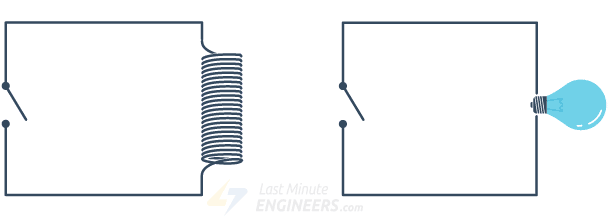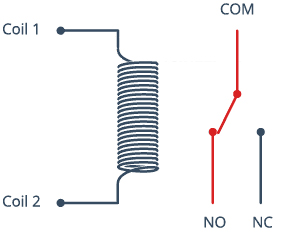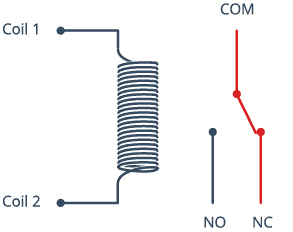...
Introduction
Applicable for appliances: VT825 & VT825DC with VT18 / extension module, VT900, VT960, VT960i, VT960ii.
These systems have the possibility to connect up to 2 x2 loads managed by built-in relays. Built-in relays have independent separate entrances and exits. The appliances (VT825 and VT825 DC) use latching relays, when power on appliance switches on/off, relays remain in command position!
Purpose
Relays are needed for control of AC mains: e.g. lamps, fans, or other devices.
Function
A relay is an electromagnetic switch operated by a relatively small current that can control a much larger current.
The relay has 5 pins, x3 of them are high voltage terminals (NC, COM, and NO) that connect to the device you want to control.
The mains electricity enters the relay at the common (COM) terminal. While the use of NC & NO terminals depends upon whether you want to turn the device ON or OFF.
Example 1: When current flows through the coil, the electromagnet becomes charged and moves the internal contacts of the switch. Normally open (NO) terminal connects to the common (COM), and the normally closed (NC) terminal becomes disconnected.
Example 2: When the current stops flowing through the coil, the internal contact returns to its initial state i.e. the normally closed (NC) terminal connects to the common (COM), and the normally open (NO) terminal reopens.
Connecting the load to VT825 and VT825 DC by relays
To connect an external load, connect the wires from the external power supply to the appropriate medium (2) clamps of the relay terminal plug, the load to the left (1) or right (3) clamps of the plug. Insert the plug into the relay socket terminal RLY1 ... RLY2. By command, the relay will switch on or off the load. The maximum possible output current of the relay - 10A.
| Warning |
|---|
| Do not insert the terminal plug into the relay terminal socket RLY1 ... RLY2 while the external voltage source is turned on. |



%20(Vutlan).jpg?version=1&modificationDate=1523611309667&cacheVersion=1&api=v2&height=250)